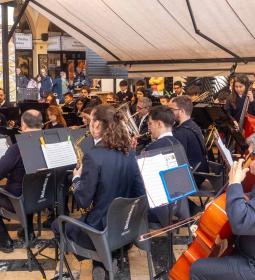The exhibition, made up of 52 of the best images from the National Geographic Society, invites us to reflect on the extinction of species and the destruction of habitats
Benidorm exhibits 'De Polo a Polo', a photographic journey through the last natural paradises on the planet

Plaza de SS MM los Reyes de España has become an open-air museum to house the exhibition 'De Polo a Polo', a photographic journey through the last natural paradises on the planet, which was inaugurated this Wednesday and which can be visited freely and free of charge until next July 22. The exhibition, promoted by the La Caixa Foundation and the Department of Culture of the Benidorm City Council, is made up of 52 images of great beauty about the various natural spaces on Earth, from the Arctic to Antarctica, with a common denominator: raising awareness about the importance of the conservation of these unique areas of the planet.
The Councilor for Culture, Jaime Pérez, and the territorial delegate of the La Caixa Foundation in the Valencian Community, Lourdes Toribio, accompanied by the exhibition's advisor, Jaume Marlès, today presented 'De Polo a Polo', accompanied by other members of the municipal Corporation, Caixabank staff and the public. All of them have invited citizens and tourists to "come and contemplate these images that not only remind us once again of the beauty of the planet on which we live, but also invite us to reflect on its fragility and the importance of protecting it." the councilor has pointed out.
Jaime Jesús Pérez has also highlighted that the content of this exhibition is “intimately linked to a philosophy with which Benidorm is very involved in its daily action and with some principles and collective goals that as an Administration and city we have internalized and want to conquer, as It is the 2030 Agenda”, since in it “three of the Sustainable Development Goals are clearly stated”, such as SDG number 13. Climate action; number 14: Underwater life; and number 15: Life of terrestrial ecosystems. Likewise, he highlighted that “in this work of dissemination, awareness, pedagogy and learning that the exhibition pursues, the La Caixa Foundation and the Benidorm City Council join hands, to amplify our strength, thereby fulfilling another of the SDGs. , number 17: Alliances to achieve objectives.”
For her part, the territorial delegate of La Caixa in the Valencian Community has thanked the Benidorm City Council for its collaboration in bringing this exhibition to the city, one more of those that have been carried out as a result of the collaboration between both institutions. Lourdes Toribio highlighted that “bringing culture closer to society is a priority for the La Caixa Foundation” and added that “working in Benidorm makes our task much easier” for this dissemination work.
Spectacular tour of the Earth's biomes
More than thirty prestigious nature photographers are the authors of the 52 photographs on display, which also bear the seal of the National Geographic Society. People can see some of the most spectacular natural spaces on Earth, many of them known as 'hotspots', terrestrial ecoregions recognized for their high biodiversity and that are seriously threatened by human activity.
Belonging to the 'Art in the Street' program of the La Caixa Foundation, among the priority objectives of the exhibition is to “bring culture, science and knowledge closer to society”, in addition to “valuing threatened natural spaces, as well as the effects of the transformation of natural ecosystems and its influence on living beings.”
From this Foundation they have recalled that more than half of the world's plant species, and more than a third of the mammals, birds, reptiles and amphibians, inhabit only 2.3% of the earth's surface, in habitats that are disappearing. Or, in other words, that the loss of biological diversity “is alarming and increasing very rapidly.”
The Asian forests, the African savanna, the Arctic and Antarctica, among others, are natural paradises to enjoy on the photographic journey that brings visitors closer to the Earth's biomes present in the exhibition. Traveling from the Arctic to Antarctica and traveling the world from north to south passing through the five continents is what people who visit the exhibition will be able to do.
Images of extraordinary beauty that show, among others, scenes such as an orangutan climbing a tree in the Sunda region of Borneo; a group of elephants in a pool in Chobe National Park, Botswana; a snow leopard in Hemis National Park, India; or the emperor penguin at Cape Washington, in the Ross Sea (Antarctica). All of them were captured by renowned nature photographers, after countless hours and a lot of ingenuity, to get the best image of the year.
These include Tim Laman, winner of the 2016 Wildlife Photographer of the Year; Frans Lanting, awarded in the 2018 edition of the Wildlife Photographer of the Year, in recognition of his career spanning more than three decades; Steve Winter, winner of the first prize of Wildlife Photographer of the Year in 2008, for one of the images in the exhibition; or the renowned Paul Nicklen, winner of the Nature Stories award in 2013.












